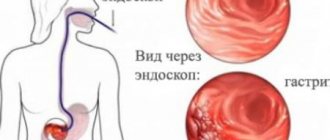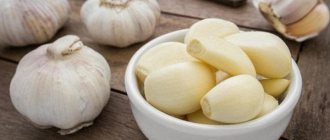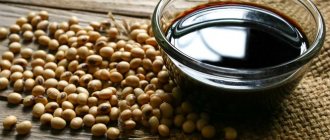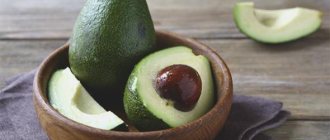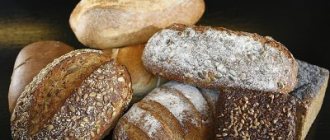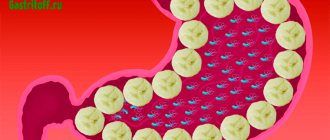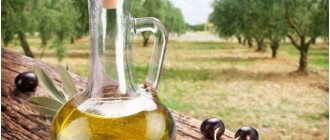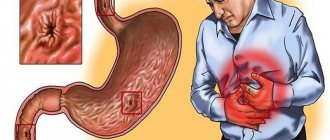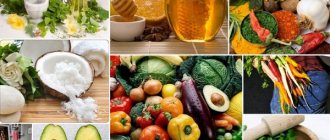Is the product allowed?
If you have gastritis, you can eat beets only in properly cooked form. Raw vegetables can irritate the mucous membrane of the gastrointestinal tract.
It is important to monitor the amount of product consumed. With gastritis with high acidity, beets can aggravate the condition. It is better to eat dishes with this vegetable with normal or reduced acidity.
Although you can eat beets if you have gastritis, you should be careful when adding seasonings. Due to increased sensitivity in the stomach with this disease, nausea and discomfort may develop.
But is it permissible to eat vegetables with subatrophic gastritis? Yes, provided that the acidity is normal or reduced. With this form of the disease, the inner layer of the protective glands gradually becomes thinner, causing atrophic areas to increase. Therefore, the vegetable can be consumed cooked in small portions.
How does a vegetable affect the body?
Beetroot has a positive effect on human health in several ways:
- Serves as a source of vitamins (A, PP, C, group B) and minerals (iron, iodine, magnesium, calcium, potassium);
- Strengthens the motility of the digestive tract, prevents constipation;
- Stimulates the secretion of gastric juice;
- Works as an antioxidant, binding free radicals, this is responsible for the antitumor effect of the vegetable;
- Increases the level of hemoglobin in the blood in iron deficiency anemia;
- Normalizes the concentration of cholesterol in the blood serum and regulates the functioning of the heart and blood vessels;
- Improves thyroid function;
- Has an antibacterial effect on pathogenic bacteria in the gastrointestinal tract.
Useful properties of the product
In general, boiled beets are beneficial for gastritis. The vegetable has the following properties:
- normalizes intestinal motility;
- prevents constipation;
- relieves inflammatory processes;
- saturates the body with vitamins and microelements;
- improves the condition of blood vessels;
- helps remove excess fluid from the body;
- has a calming effect;
- protects against free radicals;
- neutralizes pathogenic microflora;
- normalizes the psycho-emotional state;
- rejuvenates body tissues;
- improves metabolic processes.
Unlike many vegetables, beets are best consumed only after proper heat treatment. It retains all useful properties. You should take into account the rules for preparing the product so as not to harm the body.
Beetroot contains many useful substances. It is rich in iodine, zinc, amino acids and fiber. Regular consumption helps reduce blood cholesterol, get rid of toxins and waste, and protect the body from iron deficiency anemia.
What's good about beets?
Red beets are considered healthy due to the content of vitamins B1, B3, B5, B6, PP, E, C, provitamin A. The composition contains carbohydrates, essential amino acids, an abundance of fiber, proteins, potassium, zinc, magnesium, calcium, cobalt, phosphorus, iodine and iron.
Popular Product:
- increases hemoglobin;
- cleanses, dilates blood vessels and capillary walls;
- rids the body of excess water;
- exhibits adsorbent and laxative effects.
The vegetable retains its quality when cooked and baked (only vitamins C, B5 and B9 are destroyed). It's better to use a double boiler. Is it allowed to eat beets for pancreatitis?
When a product is prohibited
Although eating beets for gastritis is allowed, there are contraindications:
- exacerbation of stomach ulcers;
- severe osteoporosis;
- exacerbation of gastritis.
Raw root vegetables tend to accumulate toxic substances. The most dangerous place is considered to be the area closer to the tops. To reduce the risk, it is better to cut off this area.
It is undesirable to eat even boiled beets during periods of inflammation due to gastritis. Due to the high fiber content, it “scrapes off” everything that is on the surface of the internal digestive organs. If the stomach walls are inflamed, it will cause pain and possibly nausea.
The diet for gastritis should not include beets if frequent diarrhea occurs. Since the vegetable accelerates peristalsis, the problem will worsen.
Patients suffering from diseases of the gastrointestinal tract should monitor what products they combine beets with. The introduction of this vegetable and any yeast components into the menu leads to fermentation.
When the juice comes
If beets can be eaten for gastritis with any acidity, but in limited quantities, a drink made from this vegetable is not always acceptable.
Freshly squeezed beet juice for gastritis is permissible only with low acidity. To prepare the product, you need ripe fruits, with a thick skin and an even bright red color.
After squeezing the juice, it is necessary to let it stand in a wide container, since it contains small amounts of toxic substances that are susceptible to decay in the fresh air.
There are some factors to consider:
- for gastritis with low acidity, you can squeeze the juice and drink it, as it stimulates the production of hydrochloric acid in the stomach;
- it is better to use homemade juice recipes for gastritis, since store-bought products contain many preservatives;
- drinking beet juice fresh is not suitable during an exacerbation period;
- It is advisable to buy vegetables grown at home in ecologically clean regions.
Before using juices, you should consult your doctor. This drink can cause dizziness, nausea and vomiting.
You should avoid using the product if there is an individual intolerance to the components or if an allergic reaction develops.
In what form is it better?
For gastritis, beets can be consumed in different forms. It is necessary to understand how safe it is to consume a vegetable using a particular cooking method.
Raw beets
Raw beets should not be consumed for gastritis with high acidity:
- The vegetable will provoke an increase in the production of juice in the stomach.
- Eating raw root vegetables can cause allergies, accompanied by unpleasant symptoms (rash, itching, swelling of the mucous membranes).
Boiled beets for gastritis
Boiled vegetables retain all their beneficial properties and vitamins. Therefore, it relieves stomach pain caused by increased secretion of juice and relieves inflammation.
When cooked, beets are allowed to be taken even with acute gastritis with high acidity. The root vegetable helps relieve the symptoms of the disease and its treatment.
Beet juice for gastritis
Drinking beet juice is allowed only for people who have low acidity in the stomach due to gastritis. If the production of gastric juice is poor, this drink facilitates the process of digesting food and stimulates the formation of secretion.
- You should not drink beetroot juice from stores, as it may contain dyes and other undesirable impurities that can worsen the patient’s condition.
- It is also prohibited to take beet juice during an exacerbation of gastritis. Even with a low content of gastric juice, the product in this case will provoke a deterioration in the patient’s condition, increasing pain and the inflammatory process.
Rules for cooking vegetables
Since fresh beets can increase acidity in most forms of gastritis, you need to know how to cook them.
First, fruits of equal size are selected. It is important that each vegetable is cooked with the same heat treatment period. Then the root vegetables are thoroughly washed in warm water.
The fruits must be placed in a container, filled with water so that the products are covered. The pan should be put on fire. Once the boil starts, you can cook the beets for no longer than 15 minutes. This is the only way to really preserve all the beneficial properties.
Beets should always be boiled with their skins on and should not be pierced during cooking. There is no need to salt the water.
The product is sometimes consumed with high acidity, but only under the condition of careful heat treatment. In addition to boiling, patients enjoy eating baked beets. To do this, the washed fruits should be lightly greased with oil, wrapped in foil and placed in the oven for 15 minutes at 200 degrees.
Possible dishes
The composition of beet salad, which is allowed for gastritis, may include the following elements:
- finely chopped prunes;
- honey;
- sour cream.
There is another recipe. Boiled beets must be grated. Cut homemade cheese into cubes or crush with a fork. Mix the ingredients and season with olive oil.
You can introduce a simple dish with boiled root vegetables into your diet. It should be cut into strips, add green onions and season with sour cream. The dish is easy to prepare, does not require much expenditure and helps in treating the stomach.
Even with chronic gastritis, you can prepare delicious dishes with the addition of beets, which will practically not increase acidity. An interesting recipe for making delicious and healthy beetroot pesto sauce:
- two medium-sized beets must be baked in the oven for 15 minutes;
- 50 g of Parmesan should be grated on a fine grater;
- chop the clove of garlic using a grater or a special press;
- Peel ¼ cup of pine nuts and puree in a blender;
- add a few tablespoons of olive oil.
When the beets are ready, they must be chopped using a blender. After this, the remaining components are introduced into the container, everything is mixed and the mixture is beaten again. The sauce is ready to eat.
Although gastritis is a serious disease, timely treatment and careful adherence to diet will prevent the progression of the disease. High-quality and properly prepared products will help you take good care of your stomach health and feel good every day.
Diseases of the digestive tract require people to strictly adhere to a diet and create a diet only from approved foods. It is most important to choose a diet for gastritis, since it will primarily affect the gastric mucosa.
Benefits of beets
Red beets have become widespread due to their use in agriculture and cooking. Despite this, it also has medical significance, as it contains a number of biologically active substances and chemical compounds that help normalize the body’s condition in certain diseases.
The main beneficial qualities of beets:
- Various vitamins. This root vegetable contains a large amount of vitamins, among which are C, group B, and PP. The presence of these beneficial substances is indispensable for the human immune system. They activate its protective properties, which increases resistance to infectious and viral diseases.
- Micro- and macroelements. Beetroot contains magnesium, potassium, iron and iodine. These chemicals are important for humans, as they are responsible for creating the action potential on the cell membrane, the formation of hormones and hemoglobin.
- Detoxification. Scientists have proven that beets help eliminate toxic substances from the body. This effect is associated with the content of bioflavonoids in it, which normalize metabolism in cells.
- Strengthening blood vessels and heart muscle. The root vegetable contains a fairly large amount of folic acid, which stimulates the regenerative ability of tissues. The vascular endothelium is constantly injured under the influence of cholesterol, glucose and other organic compounds. Regular consumption of beets helps repair damage and eliminate the problem.
- Increase in hemoglobin level. This root vegetable is an indispensable element of the diet for patients with anemia. This is because high iron content stimulates the formation of the compound in the body. Reduced hemoglobin is an indication for consuming vegetables.
Despite the large list of beneficial qualities, beets are not suitable for all people. This is due to the fact that there are a number of diseases in which it is either completely excluded from the diet, or consumption is allowed, but only in certain culinary preparations.
Is it possible to have a vegetable for gastritis?
Whether it is possible to eat beets with gastritis depends on the form and nature of the inflammation. Patients are advised to avoid eating this root vegetable or limit its amount in the diet to a minimum. This is due to the fact that eating beets during acute gastritis with high acidity can cause increased contraction of the stomach walls. This is fraught with the appearance of small tears on it.
Active peristalsis in inflamed mucous membranes can cause microscopic tears, which can lead to the disease becoming erosive. In case of chronic gastritis, the use of beets is allowed only in the remission stage. During an exacerbation, you cannot eat it.
In case of inflammation of the stomach, which is accompanied by atrophy of the mucous membrane, the use of root vegetables is strictly prohibited, as there is a risk of developing peptic ulcers. This is due to the fact that when the mucosa is thinned, the deep layers of the organ are damaged, which causes the formation of an ulcerative defect.
Can it be used by patients with gastritis?
People with gastritis can eat beets, but not always:
- Considering that this vegetable contains a huge amount of useful substances, once it enters the stomach, it will force the organ to produce juice. For this reason, patients with gastritis with high acidity should never consume beets. Regardless of the method of preparation, the product will increase the acid content in the stomach, which will lead to an immediate aggravation of the disease.
- If the acidity level in the stomach is within normal limits, the root vegetable can be consumed, but also with caution. Hot spices, ketchup and mayonnaise should not be used as seasonings. These food additives will have a bad effect on the stomach, causing nausea or vomiting in the patient. Olive oil and low-fat sour cream can be used as seasonings.
How to cook
For gastritis, it is allowed to consume raw beets in minimal quantities. In most cases, the fresh product is included in salads or raw vegetable dishes. However, their number should be minimal.
It is worth noting the fact that beets are a natural sorbent. Without heat treatment, it may contain toxins and harmful substances from the soil.
For the most part, it is used boiled. Such beets for gastritis can be included in the following dishes:
- Borsch. It is worth noting the fact that the recipe for stomach diseases should not include tomato, as it contains a large amount of acid. With gastritis, this can cause increased pain, nausea and vomiting. In addition, it will significantly increase the time required for full recovery.
- Boiled beet salad. The advantage of the dish is that during prolonged cooking, individual organic acids are destroyed. In addition, vegetable oil is used to prepare this product, which has an enveloping effect on the gastric mucosa. That is, an additional protective layer is created on it that prevents chemical exposure.
Boiled beets for gastritis are used for vinaigrette. You can eat baked root vegetables. For example, to prepare a salad, the vegetable can be pre-baked rather than boiled.
Some sources recommend drinking beet juice, but this may make the condition worse. After all, beet juice contains various chemical compounds that can have a harmful and irritating effect on the gastric mucosa.
How to make medicine from beets
It’s worth noting right away that you cannot prepare medicine using vegetables or beet juice. Some adherents of alternative medicine claim that juice can be used to treat. No matter how much there is debate on this topic, this is not so.
Regular consumption of freshly squeezed juices will harm even a healthy person, and if the stomach is inflamed, this causes the development of dangerous complications. That is why you should not believe such statements and endanger your own health.
The use of beet juice, even with hypoacid gastritis, can cause the following consequences:
- Atrophy of the mucous membrane. The atrophic form is extremely difficult to treat.
- Peptic ulcer disease. Destruction of the deep layers of the stomach wall has irreversible consequences.
- Reflux esophagitis.
- Duodenitis. If beet juice gets into the lumen of the duodenum, inflammation may develop.
- Pancreatitis and cholecystitis. This is due to the fact that the liver and pancreas increase the production of enzymes when consuming this root vegetable.
- Stomach or duodenal ulcer.
Juice therapy is one of the most dubious areas of alternative medicine.
Contraindications
In addition to the fact that beets are not recommended for gastritis, they are also not recommended for use in pathologies:
- Severe diseases of the cardiovascular system. The presence of large amounts of microelements in beets, such as potassium, can provoke excessive activity of the heart muscle, which will lead to stress and the risk of developing a myocardial infarction or ruptured blood vessels.
- Individual sensitivity and tendency to allergies. If present, it is prohibited to consume beets. This is due to the fact that an allergic reaction may develop. The severity of allergies depends on the individual characteristics of the body. It is worth noting that the first symptoms are usually milder than the subsequent ones.
- High levels of hemoglobin and red blood cells. Since beets raise it, it is not recommended for patients with abnormally high levels, because there is no point in further increasing iron levels. This symptom usually appears in malignant blood diseases. Increased production of hemoglobin can cause rapid metastasis.
Beets are an excellent way to strengthen the body and restore functions, but you should be careful when consuming the product, as it can cause various disorders and have a detrimental effect on the gastrointestinal tract, despite all its beneficial qualities.
The video will tell you about the beneficial properties of beets:
Gastritis, like other diseases of the gastrointestinal tract, forces you to be especially careful when preparing your diet. First of all, you need products that are gentle on the mucous membrane and speed up the digestion of food.
A simple, affordable, familiar vegetable has long established itself as an extremely useful product in many respects. Its healing properties regulate the activity of the digestive and diuretic systems, and help in the treatment of cardiovascular diseases. Beets can be simply irreplaceable for gastritis.
Stomach ulcer bleeding. Causes
It is the most common bleeding that complicates the course of chronic callous and acute gastric ulcers and occurs in people suffering from diseases of the cardiovascular system. Sometimes, ulcerative defects on the gastric mucosa occur due to long-term use of non-steroidal anti-inflammatory drugs. The development of this complication is based on the progression of inflammatory-destructive processes in the area of the defect, increased permeability of the capillary walls and impaired blood clotting. Most often, an arrozen artery begins to bleed, less often a vein or a large number of small vessels that are located in the area of the bottom of the ulcer begin to bleed. The occurrence of a bleeding ulcer is facilitated by mechanical or chemical damage to the mucous membrane, physical stress or psycho-emotional stress, neurotrophic and thromboembolic lesions of the stomach wall and vitamin deficiency.
Due to blood loss, the patient may experience a significant deterioration in his condition. In the case of blood loss of less than 15% of the circulating blood volume, patients do not experience the development of pronounced disorders of systemic hemodynamics, since in this case compensatory protective mechanisms are activated, resulting in spasm of blood vessels in the skin and abdominal organs, the opening of arteriovenous shunts and an increase in heart rate. In this case, normal blood flow is maintained in vital organs, and if blood loss stops, the volume of circulating blood is restored due to natural depots. With blood loss of more than 15%, a generalized spasm of blood vessels occurs, the heart rate increases significantly, and the transition of interstitial fluid into the vascular bed, which initially has a compensatory nature, becomes pathological. A disruption of the systemic blood flow occurs, microcirculation deteriorates, including in the heart, brain, kidneys, arterial hypotension develops, and compensatory mechanisms are depleted. Many patients experience the development of liver and kidney failure, cerebral edema, myocardial infarction and hypovolemic shock.
Beetroot for gastritis: benefits and harms
Beets, prepared in various ways, are not only healthy, but also tasty. Dishes made from it add variety to the table and can bring pleasure to patients on a diet. Healing properties of root vegetables with high acidity.
- In case of inflammation of the gastric mucosa, beet dishes can in some cases cause harm. Let's try to figure out when and how this root vegetable is used with the most beneficial results. The level of acidity of gastric juice is decisive: increased or decreased.
- With increased gastric secretion, the walls of the stomach are injured by excess hydrochloric acid, which leads to their inflammation. Beets, even boiled, have anti-inflammatory qualities and reduce acidity.
Thanks to the rather rare vitamin U contained in the root vegetable, it is believed that it promotes tissue regeneration, heals ulcers, and therefore relieves pain. But the main advantage in this case will be the ability of the root vegetable to improve peristalsis, since food should not linger in the stomach. Constant (but moderate) consumption of beets gently regulates bowel movements.
- Pectin in vegetables not only promotes digestion, but also reduces cholesterol. Other components have a positive effect on urinary function. It is better to eat beets after heat treatment - their fiber will irritate the gastric mucosa less.
If you boil the vegetable correctly, it will retain its beneficial properties. Boiled beets for gastritis, consumed in moderation, will not cause damage even during an exacerbation.
Beetroot and chronic pancreatitis
It is worth gradually including red vegetables in the diet for people with chronic pancreatitis. In a salad, in cubes, it is better for the patient not to eat the root vegetable. It is more useful to puree beets to produce a beneficial effect on the restoration of the pancreas.
The effect of beets on the body of a patient with chronic pancreatitis when consumed in moderate quantities (up to 100 g) is positive:
- The intestines are absorbed;
- Diuretic and laxative effect;
- Regulation of the metabolic process;
- Correction of the metabolic process of fats;
- Infiltration of the liver is excluded;
- Blood pressure rises.
How to cook boiled beets, useful for all types of gastritis
- The root vegetable is boiled whole, unpeeled. It is important to select fruits of good quality , dark red in color, and elastic to the touch.
- Don’t forget that one of the features of beets is the ability to accumulate “chemicals” that get into the soil.
- The integrity of the peel should not be compromised so that there is no “leakage” of beneficial components. You don't even have to cut the tail.
- Preparation will take no more than 15 minutes. If the fibers end up feeling harsh, grate the cooked vegetable using the finest grater.
An alternative option is baked beets. Vegetables that have been well washed with a brush should be greased with any vegetable oil, wrapped in 2 layers of foil and placed in a preheated oven.
You can also stew grated beets in oil. Avoid using pickled or pickled beets for any form of gastritis. Baked or boiled vegetables are added to salads, side dishes, and cooked as part of borscht.
It is forbidden to season dishes with spices, hot and sour sauces, mayonnaise , and salt is possible in a minimum amount. Use only vegetable oils (in small volumes to avoid excessive laxative effects) and low-fat sour cream.
Beetroot recipes
- For a vitamin salad, take boiled root vegetables: half a beet and 1 carrot. Add peeled apple. Preparation: remove the skin from the fruit, chop it on a grater, mix with lean sour cream.
- For the vinaigrette, boil 2 potatoes, 1 carrot, 1 beet. Cut into small cubes, mix, season with vegetable oil.
- Baked beets with prunes can be served for dessert. Prunes are soaked, thinly sliced, mixed with grated beets, seasoned with sour cream, sprinkled with crushed walnuts. The diagnosis of “gastritis with high acidity” completely excludes raw beets from the patient’s diet.
Who can eat raw vegetables?
With “gastritis with low acidity,” it is necessary (as opposed to the form of gastritis with excess acid) to activate the secretion of gastric juices. Raw beets can start this process. This solid vegetable is rich in fiber, the digestion of which will cause additional release of acidic gastric enzymes; it contains a lot of acids.
However, even well-chopped raw beets irritate (mechanically) the gastric mucosa, which is already inflamed. Although during periods of remission it is added in small quantities to salads, using both the root and fresh leaves.
The ideal option is beet juice, if it does not provoke allergic phenomena: rash, redness of the skin, swelling. The drink will significantly improve the condition of patients suffering from chronic atrophic gastritis.
With this disease, the secretion of gastric juice decreases and the content of hydrochloric acid in it decreases. The drink, pressed from raw vegetables, is rich in B vitamins, folic acid, antioxidants, and iron. It has a comprehensive effect on the body, cleanses and regulates its systems, strengthens the immune system. Involved in the treatment of gastritis, beet juice neutralizes inflammation.
It is recommended to dilute beet juice with other fresh vegetable juices: carrot, pumpkin, apple, in a 1:2 ratio. This will soften the sharp, tart taste of the beetroot drink that essential oils give it.
You need to start taking it in small doses, adding 1 teaspoon to a glass of other juice or water, gradually increasing this volume. During the period of exacerbation of the disease, it is necessary to stop taking this drug. They take only freshly squeezed juice, for the preparation of which the best root vegetables are selected. Be sure to pay attention to the place of origin of the vegetable, from the point of view of environmental safety. The finished drink should steep a little before drinking.
Beets are ideal for gastritis with high and low acidity. But during the period of exacerbation of gastritis, discuss nutrition and diet with your doctor.
With gastritis, there are many dietary restrictions: you need to be careful when choosing fish, vegetables and bread.
Beetroot is a valuable vegetable in composition, the healing properties of which must be used in the treatment of gastritis. The main condition is to prepare and consume it correctly, depending on the type of gastritis - low or high acidity.
Beets are an affordable and healthy vegetable. People suffering from gastritis have to adhere to a specific diet, and they want to know about the risks associated with eating this root vegetable. The article will analyze the features of using beets for different types of gastritis. Beetroot is a healthy and nutritious root vegetable that has a whole range of beneficial substances.
Without them, normal functioning of the body is impossible. That is why beetroot is often used as an additional or main component in various dishes. It is used not only by compatriots, but also by chefs from all over the world. However, not everything is so simple with a tasty root vegetable, especially if the gourmet has health problems. The product is used to treat various gastrointestinal diseases, but it is important to understand whether beets are used for gastritis.
How it is used in folk medicine
The root vegetable has been used in folk medicine since ancient times. Its positive effect on blood vessels, digestion, and the genital area has been known for centuries. Traditional healers also recommend the use of beets as a general tonic, stimulating the immune system and preventing anemia.
Most traditional medicine recipes cannot be used for gastritis. In particular, boiled beets with garlic, which stimulates the body's immune defense, can cause an exacerbation of inflammation, since garlic in this case is consumed in raw, crushed form.
A mixture of raw beets and carrots, seasoned with vegetable oil, is allowed only for hypoacid and atrophic gastritis, if the components are well chopped and the addition of vinegar and spices is avoided. The combination of these vegetables has a beneficial effect on hematopoiesis and visual function.
Raw beet juice is a widely advertised folk remedy that affects almost all organs and systems. However, there is a problem of poor tolerability of such a product.
High concentrations of biologically active substances often cause digestive disorders and allergic reactions. If there is increased acidity of the gastric contents and the presence of erosions, drinking this juice is prohibited. At low acidity levels, the juice is diluted with water in a ratio of 1:5 and drunk in the first half of the day.
Beetroot drinks such as kvass and decoction are much safer. The decoction is effective for liver pathologies; it is prepared from 1 root vegetable per 3 liters of water. During cooking, at least 2 liters of liquid should evaporate. Drink the drink daily, up to 3 times a day.
To prepare kvass, raw beets cut into pieces are poured with 1-1.5 liters of water and left for 5 days. It can only be drunk by patients with low or normal gastric acidity.
In addition, the root vegetable and its leaf part are used externally in alternative medicine as a wound healing and rejuvenating agent.
Can I use it if I have a stomach problem or not?
Let's consider under what disease conditions the vegetable can be eaten and under what conditions it cannot.
The positive effect of beets on the gastrointestinal tract is as follows::
- accelerates the processes of food digestion;
- prevents inflammation;
- heals and restores, regenerates affected areas of the mucous membrane, thanks to the presence of rare vitamin U;
- improves peristalsis due to the presence of fiber;
- replenishes the body with useful microelements (sodium, iron, iodine, phosphorus), supporting the patient’s immune system.
Rules for taking beets depending on the degree of exacerbation of the disease:
In remission.
During this period, it is safe to eat boiled vegetables for any type of disease. For low-acid gastritis, it is permissible to introduce fresh root vegetables into the diet, but it is not advisable to add hot seasonings to the recipe. In chronic .
For chronic high-acid gastritis, heat-treated beets help reduce pain. The vegetable stops inflammatory processes. A raw product can trigger the transition of the disease into the acute phase. In the acute stage .
During this period, you should stop eating fresh beets, and also drink beet juice for any type of disease. Vegetables can be consumed after heat treatment.
Patients with gastritis should beware of including root vegetables in their diet in the following cases:
- acute stage of the disease;
- exacerbation of ulcers and inflammatory processes of the gastrointestinal mucosa;
- diarrhea, as the root vegetable accelerates peristalsis.
Beetroot and pancreatitis
Beetroot for pancreatitis is recommended by nutritionists and doctors as part of the diet menu. This is due to the iodine content in the root vegetable, which helps the pancreas restore functional activity. It is better to eat vegetables boiled or baked, then the vitamins are better absorbed, the fiber structure is already partially destroyed, making digestion easier. It is important to prepare the “sweet root” correctly.
Cooking beets
To ensure that the red vegetable retains more benefits and makes it easier to digest in the stomach, follow simple rules:
- The vegetable is washed thoroughly without damaging the skin;
- Immerse small beets completely in hot water without cutting them (it is better to cut large root vegetables);
- The addition of vinegar, kvass and citric acid to the water, which provoke an attack in the patient, is excluded;
- Cook over low heat for at least 2 hours, covered;
- Use grated or processed in a blender.
Inflammation of the pancreas is divided into acute and chronic. Depending on the nature of the disease, a decision is made to include “beetroot” dishes in the patient’s diet. It is important to consult a doctor in time for advice on your diet. Raw beets are contraindicated for pancreatitis of any nature. By mechanically irritating the gastrointestinal tract, the fresh vegetable disrupts the rest of the pancreas, worsening the patient’s condition and intensifying the symptoms.
Does the cooking method matter?
The way beets are prepared determines whether they will benefit or harm people suffering from gastritis. Let's consider the methods of preparing the product and the possible effects on the body.
Baked
This type of heat treatment is best suited for nutrition in case of illness with any type of gastric juice secretion. Baked root vegetables are healthy, they mobilize the body's defenses .
Let's list the reasons for possible side effects:
Hard root vegetables contain a lot of coarse dietary fiber - cellulose.
When digested, they can injure the gastric mucosa. Fiber seems to “scrape off” the top layer of the mucous membrane, causing pain.
When beets split, they release hydrochloric acid, which can damage the mucous membranes. As a result, new ulcers and erosions form, and old ones can grow.
Raw beets can accumulate toxic substances. To reduce the risk of poisoning, it is better to cut off the dangerous area located closer to the tops.
It is recommended to use beets prepared by cooking to relieve inflammation and reduce pain caused by exacerbation of hyperacid gastritis with high acidity. It will give strength and help the body cope with pathogenic microflora. Boiled vegetables are characterized by the fact that they retain nutrients .
To do this, you need to know how to properly carry out the cooking process:
- Beets must be thoroughly cleaned of soil.
- Cut off the roots, leaving a few centimeters above the growth site.
- Place in a saucepan and add water to completely cover the vegetables.
- Do not add any salt to the water; you can add a few drops of lemon juice.
- The vegetable should be cooked with its peel on and should not be pierced during cooking.
- Cooking time depends on the size of the root vegetable - from 20 to 30 minutes.
- After cooking, remove the beets and rinse with cold water.
Boiled beets can be eaten for any form of gastritis . It is important to observe moderation here.
Pickled and pickled
For any form of the disease, it is strictly not recommended to include vegetables prepared by pickling or pickling in your diet. Especially recipes using hot spices.
Beet juice
Freshly squeezed juice made from vegetables, an abrasive substance, has a strong irritant effect on the gastrointestinal mucosa. It can be drunk by people whose disease develops with a decrease in acid levels.
Experts recommend adhering to the following rules when drinking beet juice for gastritis:
- Thanks to the juice-containing effect of the product, it is easier for the stomach to digest food with reduced secretion.
- You should not drink juice in the acute stage of the disease.
- In large quantities, the product can cause a reaction in the body: nausea, dizziness, weakness.
- Store-bought juices with a large number of preservatives and additives for treatment are undesirable.
- In the presence of nitrates and other harmful substances, if the beets were not grown in an environmentally friendly area, the harm from the juice may exceed the benefits.
"Benefits" of beet juice
Beetroot drink can be beneficial for the digestive system as a powerful laxative. This property determines the popularity of drinking in various diets. “Beetroot nectar” cleanses the body with a known laxative effect, removing toxins from the liver and blood vessels, toxins that contribute to the development of cancerous tumors. Thanks to this action, blood flow increases and blood pressure decreases. If you drink beetroot drink, blood flow into the brain increases, memory and concentration develop. Juice increases the speed of recovery after drinking for many days without food or after illness. The drink must be taken internally on an empty stomach, 15-20 minutes before a meal.
The taste of freshly squeezed beet root juice is quite specific. Not everyone will like it. Proper use of the drink does not allow you to drink it “naked”. The juice must be mixed with the juices of other vegetables. It can be a “squeeze” of carrots, pumpkin, cucumber - it depends on individual preferences. When mixed with juices, beetroot drink acquires more beneficial characteristics and becomes more palatable.
Beware of beet juice
Beetroot juice for a person in good health reveals exclusively positive aspects when consumed. Will beet juice be so beneficial for pancreatitis? Unfortunately, the drink is not recommended for this type of disease. There are several compelling arguments against drinking vegetable juice.
Beetroot drink is not recommended for inflammation of the pancreas for the following reasons:
- A significant increase in acidity means irritation of the gastrointestinal tract, disruption of the calm state of the pancreas;
- Excessive production of gastric juice;
- The affected pancreas disrupts insulin secretion; beets contain sugar that is undesirable in such a case;
- Severe spasms in the intestines and stool disturbance occur.
In case of acute pancreatitis, beet juice produces an extremely negative effect on the body; in case of a chronic degree of the disease, the drink is introduced into the diet extremely carefully and smoothly. An important condition is to consume the juice 2-3 hours after preparation - due to its high concentration, which can return or intensify the disease.
Use beet juice 1-2 times a week, this is enough. If the body responds to drinking the drink with nausea, vomiting, intestinal cramps and diarrhea, the juice is immediately discontinued. If the body’s response is satisfactory, the course of treatment with red root juice should be continued without interrupting the gradual use. With the right approach, beet juice will have an exceptionally healing effect on the body.
In order to heal the ulcer as quickly as possible, in addition to regularly taking medications, you must follow a certain diet. It is recommended to exclude foods that irritate the mucous membrane and increase the formation of hydrochloric acid. Often nutritionists recommend taking dairy products, cereals, lean meats, fish, and bread. However, when consuming exclusively the named products, a shift in the acid-base balance occurs. It is better to include vegetables in the patient’s menu, which will help alkalize the environment.
Vegetables are a necessary source of vitamins and microelements, nutrients needed by humans that cannot be found in other foods. The large amount of pectin found in vegetables has enveloping properties. Pectins protect the mucous membrane from the action of harmful substances that enter the stomach with food or are synthesized during digestion. They bind harmful substances, remove them from the body through the intestines, normalize microflora, and prevent the processes of fermentation and decay. Vegetables contain fiber, which takes part in the evacuation of food from the intestines, stimulating the motility of the organ. The mentioned properties of plants are used in the treatment of peptic ulcers. For vegetables, however, there are restrictions.
Vegetables for stomach ulcers should not adversely affect the mucous membrane and increase the production of gastric juice. Most foods consumed raw are harmful during exacerbation of the disease. Of course, you need to eat boiled fruits during an exacerbation. Steamed foods are especially useful - such dishes retain a maximum of beneficial vitamins and microelements, have a positive effect on reparative processes, and accelerate healing.
Features of eating
Patients with gastritis can use beets in their diet, but they must follow the rules for its use (dosage, frequency of intake, type of processing), and only in this case will such people be able to minimize possible risks.
A doctor can recommend the optimal dose for consuming a vegetable or beet juice , so you should consult with a specialist before starting juice therapy or introducing root vegetables into your diet.
In what form can it be eaten?
Beetroot retains its beneficial properties well; it must be included in the diet of a patient with gastrointestinal pathology, especially in the spring.
Root vegetables can be taken in the following forms::
Boil vegetables until softened, peel and grate. You can add finely chopped herbs (dill, parsley) to the dish as a seasoning and add salt to taste.
- Vegetables are grated and used as a component for casseroles.
- You can use young beet leaves to make soups. It must be thoroughly washed and cut. The tops contain many vitamins and healthy substances.
- Root vegetables can be baked in the oven. To do this, wash the vegetables, wrap them in foil and put them in the oven for 15-20 minutes, temperature – 200°C. Use baked beets in salads.
- During the remission stage, it is possible to consume raw beets, but to do this, they should be processed in the following way. The vegetable needs to be grated, then kept in the cold for several hours. Add to salads, mixing with other vegetables.
- To prepare juice, you need to take mature vegetables, with thick skin, an even bright burgundy color.
How often can I use it?
The frequency of use directly depends on the patient's health status . Boiled and baked beets can be eaten in small quantities every day, limited only by your own tastes and needs. But you should not get carried away, as large portions of beets can cause intestinal upset and aggravate gastrointestinal diseases. During remission, patients with high acidity of gastric juice can periodically eat 100 g of boiled vegetables.
Thus, a properly prepared and moderate portion of a beet dish will lift your spirits, give you additional strength, and most importantly, will contribute to the recovery of a person suffering from gastritis.

